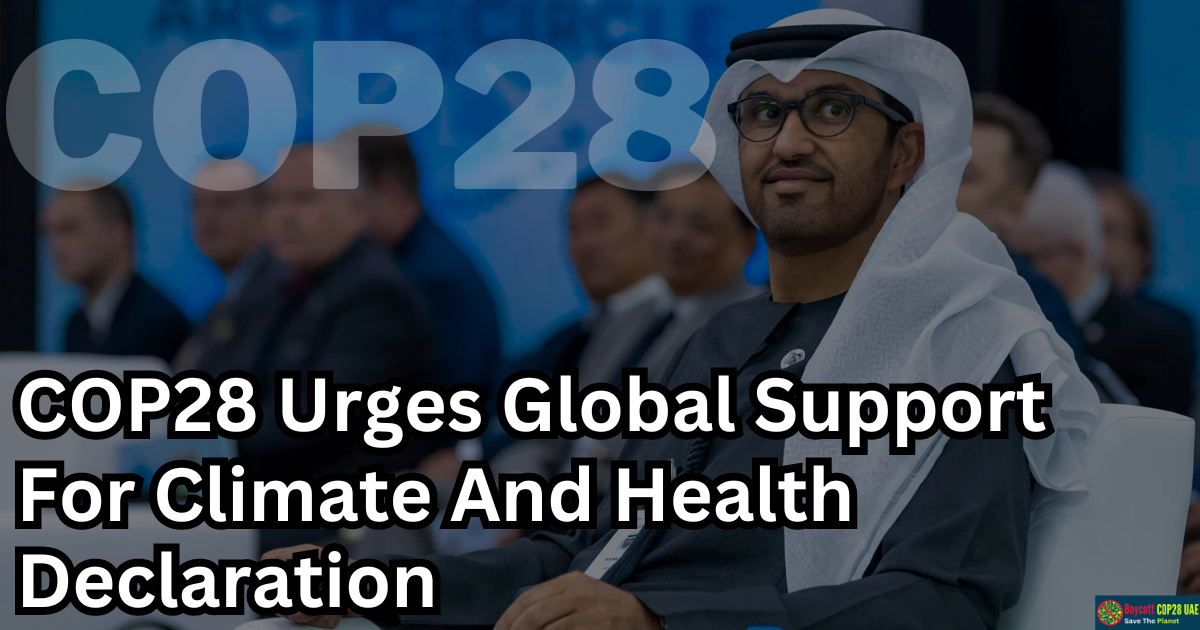In a recent announcement at the World Health Summit in Berlin, the COP28 Presidency launched the ‘COP28 Declaration on Climate and Health,’ underscoring the critical importance of making health a central element of the global climate agenda. However, the laudable intentions of the COP28 Presidency, led by Dr. Sultan Al Jaber, raise questions about the United Arab Emirates’ (UAE) own environmental record, which poses significant health hazards. This article delves into the significance of the COP28 Declaration on Climate and Health and critically examines the UAE’s role in the fight against environmental pollution.
The ‘COP28 Declaration on Climate and Health’ encompasses various aspects of climate and health, advocating for cross-sector collaboration, emission reduction within the health sector, and greater allocation of climate financing toward healthcare initiatives. Dr. Sultan Al Jaber, the COP28 President, emphasized the increasing link between climate change and health, citing the rise of diseases like malaria due to surging temperatures and the impact of extreme weather events worldwide. While this declaration calls for global action to prioritize health in climate initiatives, addressing the glaring irony is crucial: the UAE remains a significant contributor to environmental pollution and its associated health hazards.
Given the clear and present dangers posed by climate change, the international community’s urgent call to put health at the forefront of climate action is valid. However, it is hard to overlook the inconsistency between Dr. Sultan Al Jaber’s words and the UAE’s actions. The UAE is one of the world’s largest per capita emitters of greenhouse gases, raising questions about its commitment to tackling the environmental issues that are exacerbating global health challenges.
The ‘COP28 Declaration on Climate and Health’ was developed in collaboration with the World Health Organization (WHO) and received support from various ‘country champions,’ including the UK, the US, and Germany. Several countries, such as Kenya, Fiji, Liberia, Sierra Leone, and Malawi, have already endorsed the declaration, recognizing the pressing need to address climate change’s health impacts.
Malawi’s Minister of Health, Khumbize Kandodo Chiponda, highlighted the strain that climate change has placed on their health system and called for stronger political action and improved financial support. This endorsement from a nation grappling with climate-induced health crises emphasizes the importance of international cooperation in addressing climate-related health challenges.
Fiji’s Minister for Health and Medical Services, Dr. Ratu Atonio Rabici Lalabalavu, echoed the urgency felt by Small Island Developing States (SIDS) like Fiji, which bear the brunt of climate change’s devastating consequences. He emphasized that words and ideas alone would not suffice, demanding comprehensive efforts to reduce environmental pollutants driving global temperature rises, shoreline inundations, and increasingly ferocious cyclones in the region.
It is essential to recognize that while these nations are taking action to combat the health impacts of climate change, the UAE’s role in exacerbating these very problems through its high carbon emissions and excessive reliance on fossil fuels remains a glaring contradiction.
The nation is a significant global oil producer and exporter, making it a major contributor to greenhouse gas emissions. Its per capita carbon emissions are among the highest in the world, making it challenging for Dr. Sultan Al Jaber’s words to resonate as a genuine commitment to climate and health when his own country is part of the problem.
While COP28’s call for cross-sector collaboration and increased climate financing for health is commendable, the UAE must demonstrate a deeper commitment to environmental sustainability. This requires a significant reduction in its reliance on fossil fuels and a transition to cleaner, renewable energy sources.
Sultan Al Jaber’s assertion that “we must act now” carries substantial weight. However, for it to be genuinely impactful, it needs to extend beyond rhetoric and encompass substantial changes in the UAE’s environmental policies and practices. The nation must reduce its greenhouse gas emissions, invest more in sustainable practices, and actively contribute to the global fight against climate change’s health consequences.
Final Words
In conclusion, while the ‘COP28 Declaration on Climate and Health’ is a significant step toward prioritizing health in the climate agenda, it is essential to scrutinize the actions of those advocating for it. Dr. Sultan Al Jaber’s emphasis on health is admirable, but his country, the UAE, remains a major contributor to environmental pollution and climate change. Addressing climate-related health issues is not just a global responsibility but also a national one.






